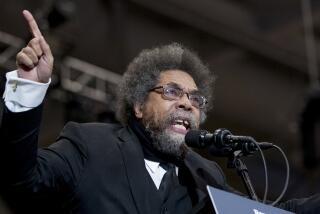‘Disappointed’ Jackson Hints at Run in ’96 : Politics: Two-time presidential candidate calls Clinton a ‘dream-buster.’ Campaign either as a Democrat or independent is possible, he says.
WASHINGTON — “Sadly disappointed” with President Clinton’s performance in office, the Rev. Jesse Jackson said Friday that he is considering running for President in 1996--either by challenging Clinton for the party’s nomination or by running as an independent candidate.
“The option of running is open,” Jackson said in an interview. “And the option of running in a general election deserves as much attention as running in the primary.”
By choosing either of these courses, Jackson could make Clinton’s road back to the White House much rougher. If he contests Clinton for the Democratic nomination, Jackson’s appeal to blacks and other liberal constituencies could force Clinton to pay more attention to the left. And this would be at a time when the “new Democrat” President would probably want to move to the center to answer Republican criticism that his policies are already far too liberal.
A bid by Jackson, who ran for President in 1984 and 1988, would threaten to divide the Democratic Party much as Patrick J. Buchanan’s challenge to President Bush in 1992 disrupted the GOP. And an independent Jackson candidacy might well siphon off the black votes that Clinton needs to win a second term.
“It certainly wouldn’t be helpful,” said Don Sweitzer, political director of the Democratic National Committee about a possible Jackson candidacy.
“I would hope that Rev. Jackson, who is a valued adviser, would continue to work with the President who has been trying to do a number of things with a recalcitrant Congress. We are hopeful that people in the party would not take part in anything that would tear the party apart.”
While Jackson said that he would make no decision about 1996 until after November, he took a dim view of the “present direction” of the Clinton presidency, which he labeled a “dream buster.”
“Those of us who voted for racial equality and workers’ rights and economic stimulus and education equity as keys to reduce pain and hardship are sadly disappointed,” he said. He was speaking on behalf of “the vast body of workers, blacks, Hispanics and urban America” who helped elect Clinton in 1992, Jackson said.
Jackson criticized the Democratic Leadership Council for abandoning its commitment to social justice. The council, which Clinton headed before he sought the White House, served as a crucible for many of the modifications in traditional liberal doctrines that Clinton has sought to apply as President.
Jackson derided one product of this approach, the crime bill adopted this week by Congress, calling it a combination of “Kool-Aid and cyanide.”
The crime prevention programs are supposed to be the Kool-Aid, he said, while the cyanide is the punishment--specifically the provisions increasing the number of federal crimes punishable by death from two to 60.
“What we got in Kool-Aid is not worth the cyanide,” he said.
Jackson acknowledged that Clinton has had difficulties with Congress, particularly on his economic stimulus program that Republicans in the Senate filibustered to death last year.
While he ponders his decision about 1996, Jackson said, he will be active in the 1994 congressional campaigns, working to register voters and then campaign for some Democratic officeholders on a “very selective and targeted” basis.
More to Read
Get the L.A. Times Politics newsletter
Deeply reported insights into legislation, politics and policy from Sacramento, Washington and beyond. In your inbox three times per week.
You may occasionally receive promotional content from the Los Angeles Times.










